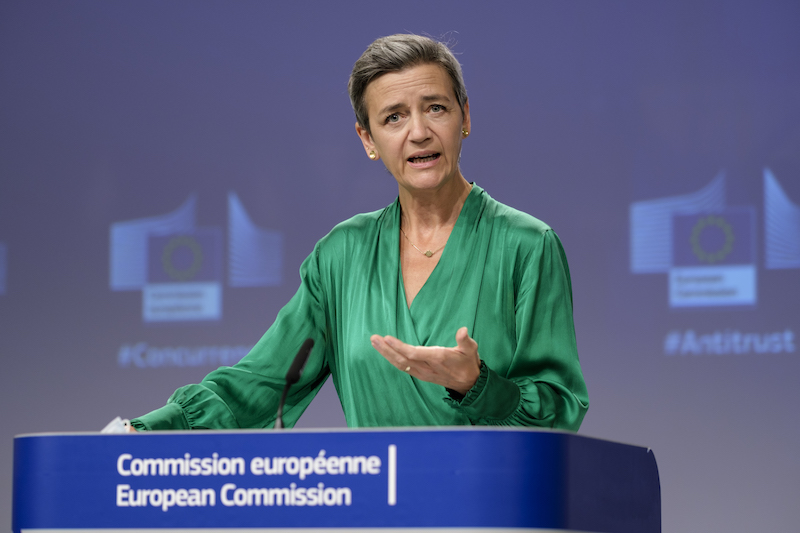
In this week’s Saturday Seminar, we collect scholarship on the EU’s Digital Markets Act.
Large technology companies have attracted concerns around the world for anticompetitive conduct.
For example, in a lawsuit against Apple, a competing company argued that because Apple controls its app store, Apple’s practice of charging a 30 percent commission on competitors’ apps is anticompetitive. Deciding on a lawsuit against Google, the European Union found that Google controls the placement of different search results, so Google’s practice of favoring its own services over competitors’ was anticompetitive.
Now, the European Union has agreed on landmark legislation to regulate tech companies that have control over important core services in today’s online world.
The Digital Markets Act would establish new rules for large technology companies that function as gatekeepers to fair competition. To evaluate whether a company is a “gatekeeper,” the EU will assess various factors, including whether the company has control over an important gateway and has a significant impact in relevant market. By this definition, companies such as Google, Apple, Amazon, Meta, and Microsoft will need to rethink their business practices.
Although the Digital Markets Act must still undergo final approval, any changes should be technical rather than substantive. In this week’s Saturday Seminar, experts analyze the Digital Markets Act and its implications for regulating technology companies.
- The proposed Digital Markets Act indicates a shift in the regulation of Big Tech, Pablo Ibáñez Colomo of the London School of Economics and Political Science explains in an article in the Journal of European Competition Law & Practice. Colomo contends that the proposed legislation would grant the European Commission more freedom from the current economic and legal constraints embedded in competition law. Instead, the Digital Markets Act would give the Commission agency to restructure digital ecosystems and to define the firms subject to its intervention. The result of this leeway, Colomo argues, is a Commission that can intervene quickly in a market environment that is constantly changing. Colomo recommends that policymakers consider this key question: How can the Commission’s actions be sufficiently constrained under this new regime?
- What is one significant challenge that the Digital Markets Act faces? Time. According to a forthcoming article by Pinar Akman of the University of Leeds in the European Law Review, regulators should “future proof” the Digital Markets Act so it remains intact in spite of future technological advancements. Akman points to the obligations that the Act imposes on firms. If the Digital Market Act’s requirements are detailed and specific, those obligations may no longer be relevant by the time the Act is passed. Akman attributes this time constraint to the ever-evolving nature of digital markets. To help future-proof the Digital Markets Act, Akman suggests that policymakers implement a framework that tailors obligations to the specific business and technological model of each platform.
- The Digital Markets Act includes key terms, such as “gatekeeper,” “blacklist,” and “interoperability,” but does everyone agree on what these words mean? In an article in the Stanford Computational Antitrust Journal, Fabiana Di Porto of the University of Salento in Italy and several coauthors explain that different understandings of key terms could lead the Act to fail. Applying computational text analysis tools, Di Porto and her coauthors show that stakeholders have different definitions of key terms, which can indicate points of controversy. They recommend that the European Commission identify these differences to find “hidden misunderstandings” and facilitate the implementation of the proposed legislation.
- While acknowledging the merits of the Digital Markets Act, Oliver Budzinski and Juliane Mendelsohn of the Ilmenau University of Technology in Germany express skepticism of the Act. In a paper, they raise concerns that the high level of detail and specificity in defining companies subject to the Digital Markets Act will impede regulators who try to enforce the Act in the future. In addition, they highlight that the novel approach of the Digital Markets Act comes with ambiguity around how it will interact with existing competition law. Budzinski and Mendelsohn argue that regulators can use the Digital Markets Act to target gatekeepers, but should use it alongside other tools as well.
- One panel of six experts agrees that the Digital Markets Act has a strong vision, but it could be even stronger. In a report published by the Joint Research Centre, Luis M. B. Cabral of New York University Leonard N. Stern School of Business and several coauthors caution that ex ante regulatory tools might not be appropriate given the nature of modern digital markets, which results in persistent information gaps between regulators and companies. Cabral and his coauthors propose that regulatory authorities appoint rotating teams of auditors from various backgrounds to balance the necessary information gathering and speed of regulatory response.
- In the United States, platforms that provide critical infrastructure for today’s markets should allow competitors to have equal and fair access to core services, according to Nikolas Guggenberger of Yale Law School. In an article in the Stanford Technology Law Review, Guggenberger proposes that regulators and courts bar platforms from discriminating against their competitors and from prioritizing their own products and services. In the long term, Guggenberger urges antitrust enforcers to stop platform monopolies by demanding interoperability at the platforms’ level and fair prices and terms. He points to the Digital Markets Act as inspiration for regulating platforms that function as digital gatekeepers.
The Saturday Seminar is a weekly feature that aims to put into written form the kind of content that would be conveyed in a live seminar involving regulatory experts. Each week, The Regulatory Review publishes a brief overview of a selected regulatory topic and then distills recent research and scholarly writing on that topic.
